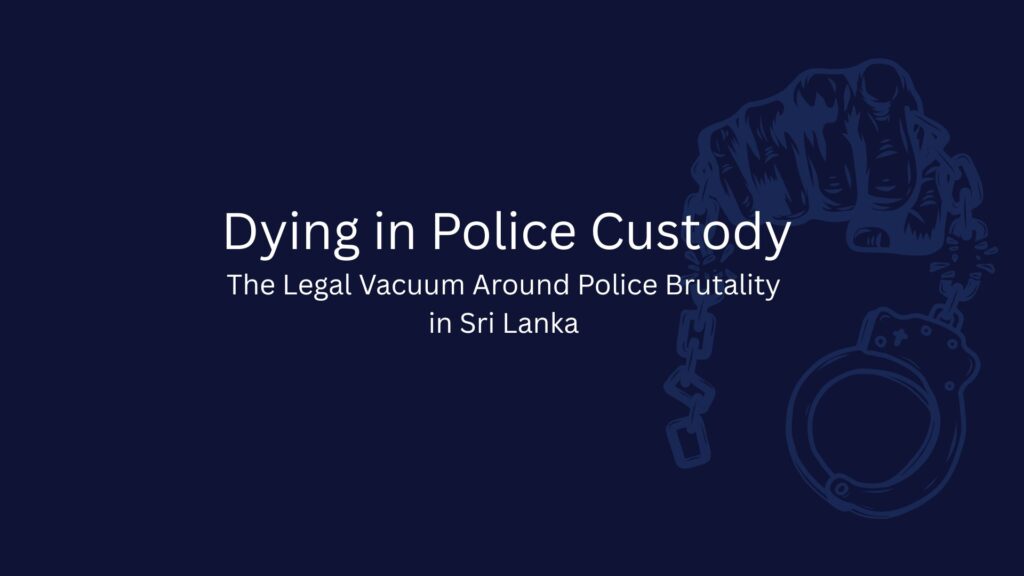
Dying in police custody in Sri Lanka continues to spark outrage, but rarely accountability. From Supreme Court verdicts that confirm custodial torture, to families left grieving without justice, a glaring legal vacuum remains. Despite constitutional guarantees and international obligations, cases like Sriyani Silva v. Iddamalgoda, Somawathi v. Weerasinghe, and the more recent Kalutara custodial death reveal how state impunity thrives. This article explores the broken legal architecture that enables this culture of violence—and what needs to change.
Article 11 and the Illusion of Protection
Sri Lanka’s Constitution guarantees that “no person shall be subjected to torture” under Article 11 (Constitution of Sri Lanka). However, this safeguard is more theoretical than practical. In case after case, victims receive monetary compensation through Fundamental Rights (FR) petitions, but rarely do perpetrators face criminal trials.
The disconnect between civil redress and criminal accountability has allowed a culture of unchecked police power to persist.
The Convention Against Torture Act: A Toothless Tiger
Sri Lanka adopted the Convention Against Torture and Other Cruel, Inhuman or Degrading Treatment or Punishment Act No. 22 of 1994, aligning itself with the UN Convention Against Torture (UNCAT).
While this law criminalizes torture, prosecutions remain almost non-existent. The lack of independent investigations, prosecutorial reluctance, and institutional complicity have made enforcement weak.
Kalutara Custodial Death: A Modern Mirror
In 2023, another custodial death in Kalutara reignited public scrutiny. While the police claimed natural causes, the autopsy suggested internal injuries. Despite widespread media coverage and public outrage, no legal action has been taken.
The Human Rights Commission of Sri Lanka (HRCSL) issued a statement but lacks prosecutorial powers: HRCSL
Somawathi v. Weerasinghe: A Court’s Recognition Without Repercussion
In this case, the petitioner Somawathi successfully demonstrated that her rights were violated by the police through unlawful detention and mistreatment. The Supreme Court acknowledged the abuse and awarded compensation. Still, criminal charges were not initiated – a common theme in such rulings.
Sriyani Silva v. Iddamalgoda: A Widow’s Fight for Justice
In the landmark case Sriyani Silva v. Iddamalgoda (SC FR 471/2000), Sugath Nishantha Silva, a victim of custodial torture at Wadduwa Police Station, died from his injuries. His widow, Sriyani Silva, filed a fundamental rights petition. The Supreme Court condemned the brutality, awarding her compensation.
However, the officers involved continued in service, and no criminal charges followed—despite a clear ruling of constitutional violations.
Why Prosecutions Remain Elusive
Several systemic factors explain why prosecutions under the Torture Act are so rare:
- Conflict of interest between the police and the Attorney General’s Department
- Political protection for senior officers
- Witness intimidation, particularly against victims and medical personnel
- Lack of independence in internal police inquiries
- Cultural normalization of torture as an “interrogation technique”
For more insight: Asian Human Rights Commission Reports
The Judiciary’s Limited Impact
Although the Supreme Court frequently rules in favor of victims, its authority is limited to civil remedies. It cannot order criminal prosecution, leaving enforcement to state prosecutors, who often decline to act.
This failure to bridge the gap between constitutional violations and criminal responsibility erodes public trust in the system.
Urgent Need for Independent Oversight
What Sri Lanka lacks—and desperately needs—is a permanent, independent police oversight commission. Such a body must:
- Be free from political influence
- Have prosecutorial referral powers
- Be constitutionally guaranteed
- Include civil society and legal professionals
Countries like the UK (IPCC) and India (NHRC) offer instructive examples of semi-independent oversight bodies, though imperfect.
Changing the Public Narrative
Many Sri Lankans see police brutality as a necessary evil in the fight against drugs and crime. This mindset, if left unchallenged, will continue to fuel systemic torture.
Media, schools, and civil society must debunk these beliefs and emphasize human dignity, due process, and the rule of law.
Conclusion – Dying in Police Custody
From SC FR 578/2011 to Sriyani Silva v. Iddamalgoda and Somawathi v. Weerasinghe, Sri Lanka’s record on custodial justice paints a bleak picture. Though the law is clear, its implementation is obstructed by fear, politics, and indifference.
Until the state empowers independent mechanisms, holds officers criminally liable, and reforms the Attorney General’s prosecutorial discretion, torture will remain an unpunished crime.
Justice cannot remain symbolic. It must be operational—and accessible.
FAQs on Dying in Police Custody
What does Article 11 of the Constitution protect against?
It guarantees protection from torture, cruel, inhuman, and degrading treatment by state actors.
What is the significance of the Convention Against Torture Act in Sri Lanka?
It criminalizes torture but is rarely enforced due to systemic failings.
Why don’t Supreme Court rulings lead to prosecutions?
Because the Court only awards civil remedies. Criminal proceedings require action by the police or the Attorney General.
What’s the difference between FR petitions and criminal trials?
FR petitions result in compensation for rights violations, while criminal trials seek to punish perpetrators.
What reforms are needed to fix this?
Independent oversight, better prosecutorial independence, and legal reform linking FR judgments to automatic criminal investigations.
How can the public help?
By raising awareness, demanding transparency, and supporting human rights watchdogs.
Get access all the law reports including all NLR and SLR Volumes and all Sri Lankan case laws in AI Pazz. Sri Lanka’s largest and the most up-to-date digital legal library.